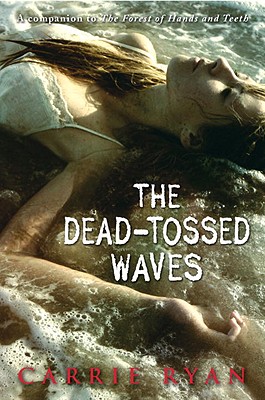in·de·ci·sive
Function: adjective
1 : not decisive or final <an indecisive battle>
2 : finding it hard to make decisions <an indecisiveperson>
Function: adjective
1 : not decisive or final <an indecisive battle>
2 : finding it hard to make decisions <an indecisiveperson>
fick·le
Function: adjective
: likely to change frequently without good reason :<fickle friends>
Function: adjective
: likely to change frequently without good reason :<fickle friends>
- (of a person) Not friendly or cooperative; unlikeable
- - a totally unsympathetic character
un·sym·pa·thet·ic
adjective /ˌənˌsimpəˈTHetik/ |
Before I get started on the current book review, let me just say I loved Carrie Ryan's debut novel, The Forest of Hands and Teeth. LOVED. As many other readers, I was completely taken with the emotionally horrific tone that relied on heartbreak and bleak outlooks rather than gore or mindless terror. The book perfectly captured the subtlety and true frights of a nightmare world, and--in my opinion--settled in the same strata as Stephen King's more thriller-oriented offerings such as his Dark Tower series and his cult classic, The Talisman (a personal favorite of mine).
One doesn't have to have read Ryan's Forest to engage with its companion novel (set some fifteen-ish years later), The Dead-Tossed Waves. In fact, not having read Forest might be considered a perk, as the first 300 or so pages of Waves so closely mirrors its predecessor, they could almost be the same book. Swap some names around, tweak the setting, and voila! They're interchangeable. Or, if you need a visual aid, please refer to Mr. Swayze's version of this point:
Thank you, Patrick. Second verse, same as the first, indeed!
All that aside, the reasons for the definitions above. They describe my main impressions of the narrator and main character, Gabry. While the writing style--with the exception of some places I felt tried too hard--holds up in quality to Ryan's first offering, the things that kind of irked me in Forest have returned in Waves to explode into full-on loathing. In the two-or-less weeks of Gabry's story she waffles between "loving" two boys, wanting and not wanting a different life, being petulant or dismissive of things she doesn't appreciate, and cowardice and courage . . . sometimes within minutes of each other. She wants Boy A she's known her whole life, no, wait, she wants Boy B she just met and who keeps freaky company. No, no, Boy A is going to kiss her! She wants him! No, Boy B, who's just brushed her hand with his! She wants to stay safe in her little village. She wants to escape her little village. She wants to live/ there's no point to living anymore!
What's meant to create conflict, suspension and a sense of always being on the cusp of something epic only irritates and makes Gabry seem like one of the most stupid girls on the planet. Are we supposed to think the mind of a post-Return youth is conditioned towards such blatant abuse of free will? That people are so desperate they'll clutch at whatever is closest to their grasp, just like the constantly-moaning, constantly hungering Mudo? I don't. But then, my loyalty streak is as wide as my stubborn streak.
I will put this in the positive column, however: I very much enjoyed the addition of a certain sect of deviant characters. I won't spoil anyone with how or why I say 'deviant', but I don't mean it in the pop-culture sense of the word, but the traditional meaning. I thought their inclusion was a very nice foil layer, and their actions went far to ensure some doubt about the mental state/noble motivations of one of the potential suitors. Niiice.
Unfortunately, that admiration isn't enough to get The Dead-Tossed Waves out of a Bypass. Sorry.

No comments:
Post a Comment